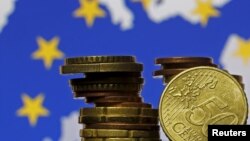Bosnian Serb leaders refused on Wednesday to sign a reform agenda demanded by the European Union as part of a drive to speed up Bosnia's joining the bloc, prompting the EU enlargement commissioner to cancel a visit to Sarajevo.
The European Union launched a new strategy for Bosnia in December, focusing on economic and social reforms and not on difficult political issues, in an effort to revive the Balkan country's stalled bid for a membership.
A written commitment by rival Muslim Bosniak, Serb and Croat leaders has paved the way for EU to put in force this month a long-stalled Stabilization and Association Agreement [SAA] with Bosnia.
Bosnia lags behind its ex-Yugoslav peers on the long road to joining the 28-nation EU. It has struggled to overcome ethnic divisions that still linger, almost 20 years since the end of a 1992-95 war in which some 100,000 people died.
Its development has been stifled by a highly decentralized post-war system of government that divided power along ethnic lines and spawned huge networks of political patronage.
The governments at all levels of Bosnia's complex system were expected to sign a draft reform agenda by Wednesday, and then seal it with EU Enlargement Commissioner Johannes Hahn on Thursday.
But the Bosnian Serbs rejected the reform program, complaining they were not directly involved in drafting it.
In a statement announcing the cancellation of his visit, Hahn urged the government of the autonomous Serb Republic to follow in steps of the central government and the government of the Bosniak-Croat Federation, which signed the agenda.
"The country faces serious socio-economic challenges which require swift and bold decisions and actions putting the interest, stability and prosperity of the country and its citizens beyond party interests," Hahn said in a statement.
A big chunk of the reforms demanded by the EU relate to economic and financial issues. They will be the topic of talks about a possible new arrangement with the International Monetary Fund, which begun on Wednesday.
Bosnia's two regions desperately need IMF cash to plug in their widening budget deficits.
"The EU is ready to support this reform agenda with substantial funds. However, these can obviously only be committed in case the reform agenda is properly adopted and implemented," said Hahn.





